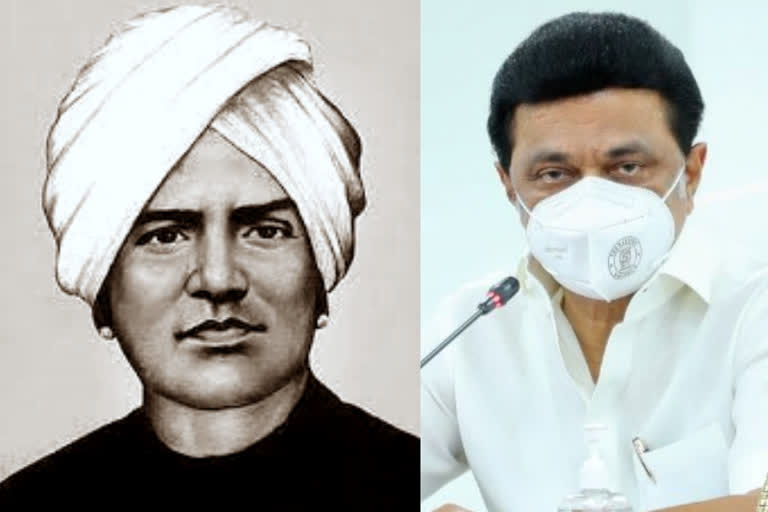Chennai: Tamil as a political idiom and a vehicle of modernity was first conceived and popularised in mainstream conversation by Iyothee Thass Pandithar much ahead of others more than a century ago. In his quest towards constructing a new casteless identity, he found Tamil as the glue and thus remains the precursor of the Dravidian movement. Making amends for the long neglect is Chief Minister MK Stalin's acknowledgment and announcement of a grand memorial for the late thinker and social reformer.
This is yet another significant step of Stalin in reclaiming the Dravidian legacy and its ideological moorings. For, it was Iyothee Thass who gave political currency to the term 'Dravidian', though it was first used by Bishop Robert Caldwell in his work: A Comparative Grammar of Dravidian Languages.
It is no coincidence that the present Covid pandemic also reminds us of another pandemic, the plague, and a horrendous famine that struck the country almost 110 years ago. When dailies and magazines in Madras state were giving updates of the pandemic and the famine, one publication alone devoted itself to the plight of the subalterns. It was 'Tamilan' founded by Iyothee Thass. He was critical of the nationalists for not addressing the sufferings of the downtrodden.
Born as Kathavarayan in Royapettah in Chennai on May 20, 1845, he studied at a 'Thinnai Pallikoodam,' school at the forecourt of a teacher's residence. Out of reverence and affection for his guru, he took the name of Iyothee Thass after his teacher, Iyothee Thaasa Kaviraja Pandithar.
Encounter with colonialism provided a window to modernity and Iyothee Thass' family, practitioners of the traditional Siddha medicine, had such an opportunity with his father, Kanthappan, being a servant of a British officer, Francis Whyte Ellis, a Tamil-Sanskrit scholar. It was Kanthappan who provided Ellis with the palm leaf manuscripts of the Sangam classic 'Tirukural', the famed couplets of Thiruvalluvar, and 'Naaladiyar', an ethic treatise, preserved by his family. This was how both the works got into print.
When the family moved to The Nilgris, young Iyothee Thass founded the Advaita Sabha in 1870 with the objective of fighting caste system and proselytisation. But, soon he founded the Dravida Mahajana Sabha and organised its first conference in Ooty which passed a resolution demanding legislation to punish those who called the Dalits as Pariah's. During the 1881 census, he pressed for enumerating the Dalits as 'Aathi Tamils' (Ancient Tamils) and not as Hindus. During this time, he also launched the magazine 'Dravida Pandiyan'.
On return to Chennai in 1893, he got in touch with Col HS Olcott first president of Theosophical Society and eventually embraced Buddhism. Thus, Iyothee Thass Pandithar became a forerunner to Babasaheb Ambedkar in embracing Buddhism. In 1907, he started 'Oru Paisa Tamilan' (One Paise Tamilan) and later changed it into 'Tamilan'. Interestingly, the weekly was brought out from its own printing press, when Chennai-based dailies did not have their own press. 'Tamilan' was in circulation till his death in 1914.
“Buddhism of Iyothee Thass was essentially Tamil Buddhism and Buddha was god as a political philosopher,” says Dr C Lakshmanan, a faculty at Madras Institute of Development Studies. A polyglot, he was well versed in Tamil, Sanskrit, Pali and English and he studied society through oral traditions and folk narratives to arrive at new insights. “Despite advocating Tamil Pride, he was never against any language,” Lakshman maintains.
“His entire work was devoted to re-reification of society and carry forward towards modernity. Re-reification, which is reordering of society, requires understanding and vision to create anew. And he found in Tamil Buddhism that possibility. His 'Indira Desa Sarithiram' (History of Indra Desa), is such an attempt and the first subaltern history,” explains G Aloysius, author of the three-volume collected works of Iyothee Thass. “Annihilation of caste and attendant hierarchies constitute the important component of modernity, and the crusade that Pandithar carried is yet to be accomplished,” he says.



